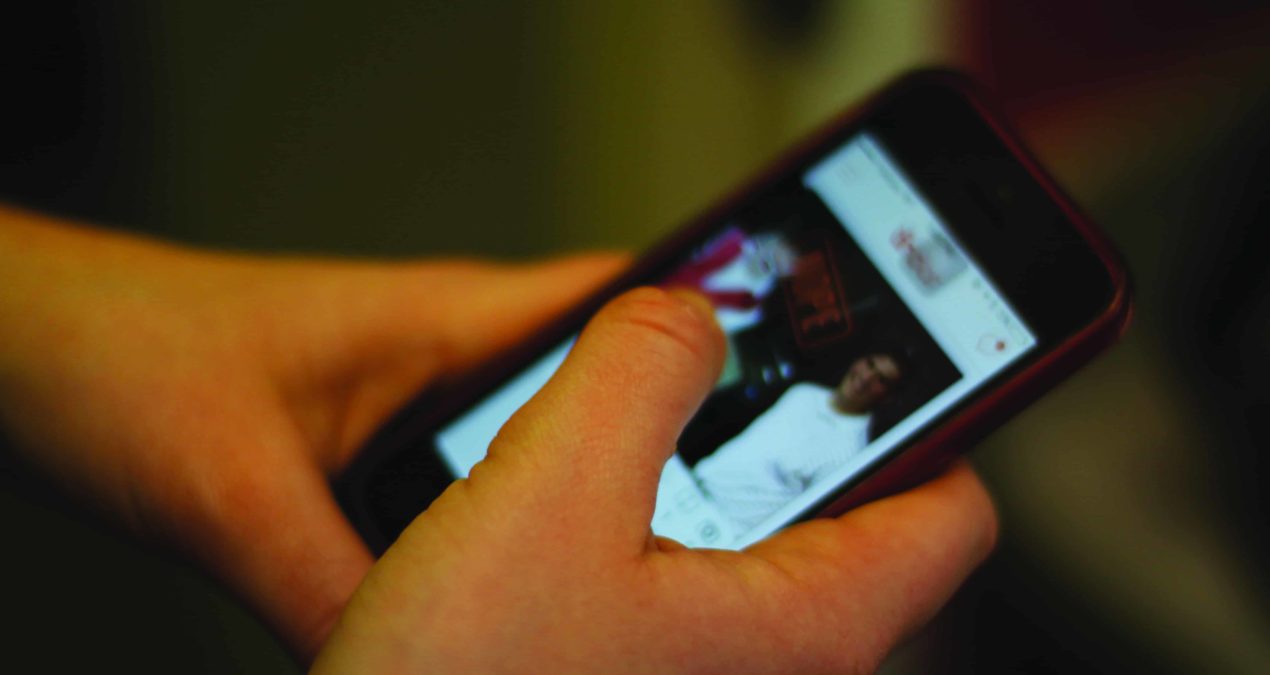By Laura Carr
Asisstant Sports Editor
Alex Haddad ’17 rests comfortably in his massage chair in Smith Hall. His black iPhone 4 vibrates, alerting him that he has new possible matches on Tinder. He opens the app. His first option is a girl that sits next to him in his FYS 102 class.
He is posed with the dilemma of whether or not to swipe left and risk the possibility of appearing rude or swiping right and potentially creating an awkward situation.
Tinder is a location-based social networking app that uses Facebook to connect mutually interested individuals.
The cell-phone application, initially released on Sept. 15, 2012, is used primarily for dating, but it can also be used to make friends.
The application’s website claims that “Tinder is how people meet. It’s like real life, but better.”
Tinder allows people to swipe left or right based on whether they are attracted to the other person or not. A swipe to the left is the equivalent of a “no” vote while a swipe to the right could mean a possible match. If the other user also swipes right, both users receive an alert that they have been matched, and subsequently have the option of initiating a conversation.
“I use Tinder to meet like-minded individuals that share a similar body of interests,” Alex Haddad ’17 said. “I downloaded Tinder because after deep reflection, I looked at Tinder not only as an application that hooked people up but as an application that brings souls together in a way that transcends the boundaries of a cell phone.”
According to statistics that Tinder founder and CEO Sean Rad released at Upfront Summit on Feb. 27, the application is doing 750 million swipes per day that lead to 10 million introductions, up from five million matches in Dec. 2013.
“I think Tinder is becoming so popular because a lot of people use it when they’re bored,” Lauren Wilhelmy ’17 said. “I think it’s funny.
Some people have interesting profiles to look at and it’s especially entertaining when you find one of your friends as a potential match.”
Because the application is more casual than other online or virtual dating networks, some individuals use Tinder to joke around or for a confidence boost.
“I know some girls that use Tinder as a confidence booster,” Wilhelmy said. “Because swiping right is all the effort it takes to meet someone attractive, it is the equivalent of receiving a compliment from someone in person.”
Ryan Keller ’16 said that he spent some time on his most recent Saturday night helping a friend come up with corny pickup lines to use on Tinder matches.
“We just Googled some cheesy pickup lines on Google just for the hell of it,” Keller said. “He was just trying to start some conversations with people that he got matches with on Tinder.
I think one of the pickup lines was ‘Do you have a Bandaid because I scraped my knee falling for you?’ I don’t know if it worked, but it was funny.”
Many Denison students said that they use Tinder primarily as a source of amusement.
“I use Tinder for fun when I’m bored,” a junior history major from New York said. “I don’t get anything out of it; I just swipe peoples’ faces left and right. It’s hilarious; I don’t use it to hook up with anyone.” The student requested anonymity.
Zach Cove ’17 added that the application is similar to other social media applications that are preferred by Generation Y.
“I use it for entertainment when I’m bored. [Tinder] honestly doesn’t say anything more about our generation than Instagram or Twitter does. They’re the same thing. I like swiping to the left.”
Denison students contend that the application reflects that Generation Y is heading towards a more digitalized form of dating.
“It shows that our generation is moving towards more social media, more electronic-based.
It signalizes on looks and what you can see in five pictures as opposed to talking to them and their interests,” Tim Smith ’17 said.
Kelsey McCormick ’17 says that one thing is clear: “Tinder is not the place to find a relationship.”Despite the relative unlikelihood of finding a relationship on Tinder, there is still a possibility of meeting someone that you have common interests with, maybe even here at Denison.
Photo courtesy Nelson Dow

